“The oral tradition is for me a cult”, interview Ana Paula Tavares
Ana Paula Tavares has big soft eyes. And an intensity in her writing that makes her one of the best loved of all Angolan poets and writers. In an e-mail interview from Lisbon, where she lives, she tackles aspects of her writing and her life. It’s not in chronological order, but the lightness of spirit holds you by the depth it displays.
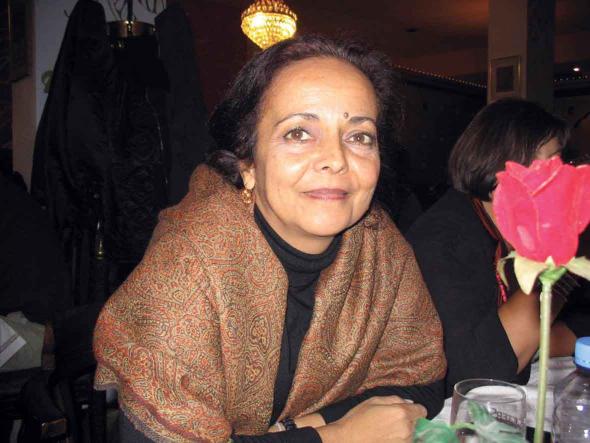
You are normally highlighted as a point of reference for poetry written by women in contemporary Angola. What does that mean in fact?
Well, it isn’t true. It would be a very big injustice to Ana de Santana, Liza Castel and Maria Alexandre Dáskalos, to choose only three names of intense and original creative writers in the world of Angolan poetry. Other contributions of great quality cannot be put to one side just because of the number of works one has published. I try to find a place in the universe of Angolan poetry because my language comes from Angola. I am not one for competitions, summits or special orders.
You grew up in Lubango, in a society that was markedly colonial and European, where the African society you were part of was completely ignored, though it fascinated at the same time. Does your work mirror or shy away from this reality?
We all have a place that we come from, a childhood, as the poet said. I was born in Huíla, in the midst of an unjust colonial society. There were pastors there. What I owe to the Nyaneka society is poetry, music, the sense of smell, southern orientation. Contact (for anyone in the process of assimilation) was forbidden to us. And it was for this very reason stronger. To learn and to know who they were and who we were was always linked to the paradigm of orality, the flame that wells from being of a place, being aware of the cycles, respect for difference, and an abhorrence of injustice.
Huíla is said to have influenced you from the aesthetic point of view, above all through the smells, the sounds, the colours and the songs that left an indelible mark on your aesthetic self. The interaction of senses is a constant in your work – is that where it comes from?
The interchange of the senses, or the appeal of the senses, is a kind of sickness that I have carried with me since childhood. If I hadn’t been born where I was in fact born, maybe I would be more normal.
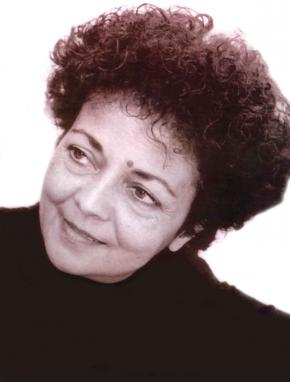 Apart from Lubango, you have also lived in Huambo, Gabela, Sumbe, Benguela and Luanda. A Luanda that you were always putting off, as you have confessed. What traces were left in you from these places?
Apart from Lubango, you have also lived in Huambo, Gabela, Sumbe, Benguela and Luanda. A Luanda that you were always putting off, as you have confessed. What traces were left in you from these places?
I remember my time in those places. In Huambo, I learnt other colours of fear, as I was teaching older people to read in the surroundings of the city. I experienced the limits of physical courage, I made friends who have been life long. In Kwanza- Sul (Gabela, Sumbe, Kibala, Ebo) I realised that the history of Angola had as many different times as it had different speeds. I was crushed by the impotence all around. I realised the extent of my ignorance. What were these times of burial places in dry rock, surrounded by silent granite island-icebergs full of paintings in caves you couldn’t reach? Was it possible to interpret these messages in the midst of the mad cacophony of war? The dream of sequence in time past and how it fitted has always since then pervaded my writing and my life. I had a daughter and this meant that everything started again, the water was pure, the sense of myself was new. Fear returned. I would be capable of protecting, and running through the rivers again. Sumbe helped to burn the memory of evil in me, and it has never left: slavery, colonialism, relationships of ownerships, small and great powers, the definitive enlargement of the feeling of history in daily life. Benguela reinforced my notion that there were places you belonged to and places that rejected you. The poetry of place was a long apprenticeship. It was not inside me. This was a language I had to learn. Luanda is the start of a city that from time to time ceases to be a city. It lives well with its ghosts, but it also lives badly with them. The bay is magical, it has the finest curve in the world. I almost went mad trying to understand. I made pacts with God and the devil. But it was there that the strength of my countrywomen became clearer, the way they tread, lightly, even though they are carrying a child on each arm and another on their back and the troubles of the whole world on their shoulders.
You have already described your leaving Huambo for Luanda, at the time of independence, as a “fantastic flight that one day I will have to tell”. Do you want to make this the first time?
It would not be the first. I remember that the poet Costa Andrade, Ndunduma, who is unfortunately no longer with us, left in his book of memoirs, Adobes de Memória (two volumes), a version of that fantastic and terrible adventure. I owe it to my travelling companions to say for the moment nothing.
There are those who talk of a specific “Angolan world” that is Paula Tavares’. What world is this – the Angola of your childhood, of independence, of 1992, or of now, from a distance?
I don’t know who said that. I suppose it’s because I don’t know how to talk about anything else. Angola hurts me every day, and it cheers me in the same fashion. It gives me the true measure of what I do not know.
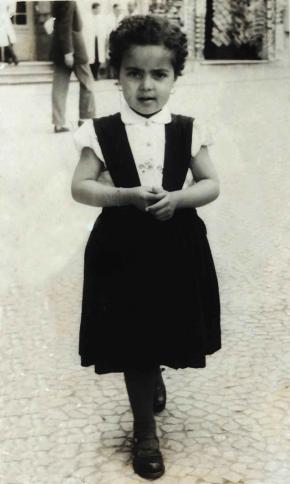
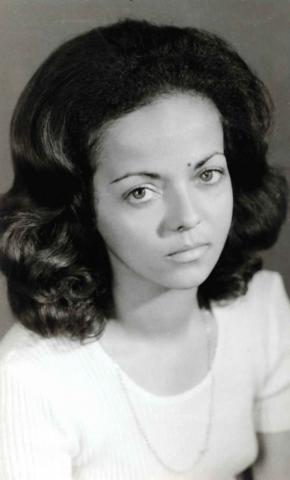
Africa, Angola, Japan in the light of Mishima, Europe. Your places. Where do they intersect?
The floor, the earth, feelings, reading.
Do you consider yourself to be a universal writer?
No. Who am I to say this? The world is vast and strange.
One’s relationship with the body and sex in Africa is also very different from western societies. Are the sensuality and eroticism in your works related to our greater ease with our bodies?
I think this famous and much talked of relationship with the body does not exist. We have also had, and we have, churches that teach us to be ashamed of our bodies. There are women who do not have the time to grow and listen to their bodies. There are violent relationships and there is suffering in silence. There is behaviour that is city-life and behaviour correct for far-flung places. There are unjust relationships governed by the power of the dollar, and by the exercise of power. Old colonial myths survive, sometimes donning new masks, even in times when colonialism has completely disappeared.
Your first book, Ritos de Passagem (Rites of Passage), was in fact received in Angola with heated debate. It is seen as “full of spite”, “pornographic”, as one interview has it…
This just goes to show how old and new errors and the age of innocence are paid for in tears of bitterness.
You wrote when you were very young, “to frighten away the fears”. What fears did you have as a child?
All the fears that children have, fear of the dark, fear of the light, of injustice, of losing and of winning.
Do you still write with the same aim? If that’s a yes, what are the fears of the adult Ana Paula Tavares?
Writing has many senses. The topics are vast. I am not enclosed in a shell of fear. Now there is anguish: I cannot bear to see friends leave or the sufferings of some of them. The fear of being far away, too far, the idea of losing my voice, and losing the moment when poetry has its turn.
You have defined Brazilian literature and music, brought to you by travellers, as great influences on you as a writer. What specific impact have they had?
Brazilian literature and music came to me in waves, at every point when I was growing, maturing and getting old. Chico and Caetano, Elza Sores, Elis Regina, Tom Jobim, and many others. Poetry made its mark with Manuel Bandeira, Drummond de Andrade, Murillo Mendes, and the definitive João Cabral de Melo Neto. Then there is prose, and there’s always a place for Clarice Lispector, Nélida Pinon, Lygia Fagundes Telles. The most recent discoveries have been Radnuam Nassar, Milton Hatoum and Bernardo de Carvalho, who tell me I must always be aware of what is happening on the other side of the Atlantic.
You have worked a lot on collecting the oral tradition in Angola. There are those who say that your work can be read aloud, that it loses none of its strength, it doesn’t “get lost on the way”.
The oral tradition is for me a cult. Mothers rock their children singing or chanting in all of our languages. If my works can be read aloud, that makes me very happy.
Where are you up to in your project on Lunda and Tchokwe cultures?
Once my thesis [for a doctorate] is handed in, the struggle for knowledge goes on.
Do you consider your writing to be ritualistic?
In no way.
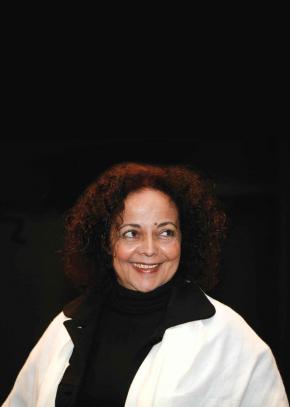
The second work you published, Sangue de Buganvília (Blood of the Bouganvillea), came a full 13 years after “Ritos de Passagem”. And you move from poetry to prose. Why the long break and why the change in genres?
I never stopped writing. It was just that I didn’t see the need to publish. And writing is always in two registers: poetry and the short story which is a mix of chronicle and tale.
always in two registers: poetry and the short story which is a mix of chronicle and tale.
Do “prose” and “poetry” live separately? Are they what we consider them as concepts, or do they go beyond us?
They can live separately or mixed up as much as you like. For me poetry can live separately but prose (mine, anyway) lives in another way, as a vampire, through suffering.
What possibilities or limitations are in front of you?
Possibilities, all. Limitations: I recall the proverb from Cabinda «The centipede has 100 legs, but it always walks on the same path».
You are said to be profligate in your use of words. Don’t words have a defined value, like the prices on products in a supermarket?
Words have their own value. It depends on who uses them and how they are used.
Femininity, feminine literature. Are these merely labels or serious problem issues?
They are not mere labels. The feminism of the 60s in the last century is no longer in fashion, or else it takes on facets that are so rigid in terms of criteria that they overwhelm our beliefs, our goals, our sensitivities. But I remain sensitive to the difference: what women write, what women live through, even women who are presidents or ministers, is totally different from what men live through. Even if I am far from a theory or an interpretation of this, I still read and feel this difference.
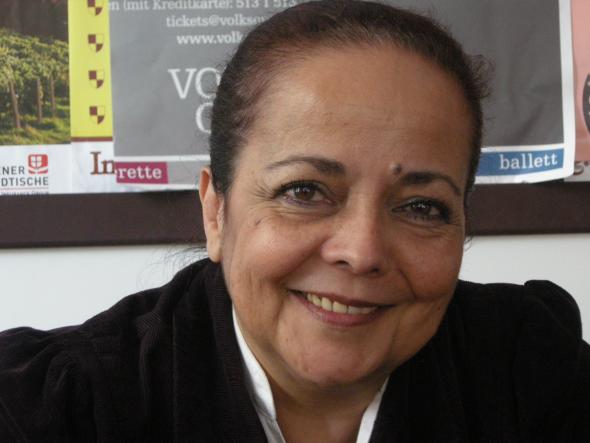 fotografia de Marta Lança
fotografia de Marta Lança
Ana Paula Ribeiro Tavares comes from Lubango, where she was born on 30 October de 1952. She studied History in what was then the Faculty of Humanities (now the ISCED), and she completed the course in Portugal. She has a Master’s in African Literature written in Portuguese.
Straight after independence, she became culture delegate for Kwanza-Sul and a specialist in the Centro Nacional de Documentação e Investigação Histórica (today the Arquivo Histórico Nacional), which is part of the Instituto do Património Cultural. In the 80s she was in charge of the Research Bureau of the Centro Nacional de Documentação e Investigação Histórica, in Luanda.
She has worked in culture, museum sciences, archeology and ethnology.
As a poet and writer, she has published a number of works, among them Ritos de Passagem (1985), O Sangue da Buganvília (1998), O Lago da Lua (The Lake on the Moon) (1999), Dizes-me coisas amargas como os frutos (Tell me bitter things like certain fruit) (2001, winner of the Prémio Mário António de Poesia 2004, awarded by the Calouste Gulbenkian Foundation), Ex-votos (Votive offerings) (2003) and A Cabeça de Salomé (The Head of Salome) (2004). Her work has been published in anthologies in Portugal, Brazil, France, Germany, Spain and Sweden.
in AUSTRAL nº 78, TAAG - Linhas Aéreas de Angola